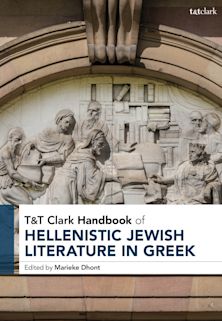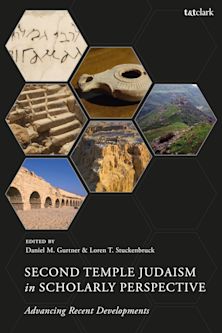- Home
- ACADEMIC
- Biblical Studies
- Early Jewish Writings and History
- A Hellenistic Ethical Lexicon
A Hellenistic Ethical Lexicon
Three Hundred and Seven Rules of Conduct of Expanding Empires
A Hellenistic Ethical Lexicon
Three Hundred and Seven Rules of Conduct of Expanding Empires
You must sign in to add this item to your wishlist. Please sign in or create an account
Description
Building on his previous work on Hellenistic Interstate Political Ethics (T&T Clark, 2022) leading historian Doron Mendels presents three hundred interstate ethical rules of conduct which he has discovered within three reconstructed Hellenistic codes. These codes appear in the work of three major Hellenistic historical writers, with Mendels also adding remarks that appear in The Letter of Aristeas.
Mendels has formulated these – probably originally oral – rules embedded within the historical narratives using a mixture of statements by rulers and other actors concerning interstate relationships, historical events which point to ethical behaviour of states and/or their breach, as well as related thoughts of the historians themselves regarding interstate encounters. The result is a comprehensive catalogue of ethical rules referring to behaviour on the international scene, which include not only rules but also a lexicon of moral terms borrowed from the individual ethical scenarios. The volume constitutes a significant addition to knowledge of the Hellenistic era in the 3rd-1st centuries BC, the universe against which Judaism and early Christianity operated.
Table of Contents
Abbreviations
Introduction
1. The Ethics of Ruling an Empire during Conquest: Ptolemy I (3rd century BCE, Ptolemaic
Egypt)
2. The Ethics of Interstate Relationships during Imperial Expansion: Polybius (2nd century BCE
Greece)
3. The Ethics of Interstate Relationships during the rule of an 'International Regime' (1st
Century BCE Rome)
4. An Analysis of the collection of rules of behavior as a newly discovered facet of the
Political Science of the Hellenistic Era
5. The Jewish Response to the Hellenistic interstate ethical code (2nd-1st Centuries BCE,
Palestine)
Bibliography
Index
Product details
| Published | 12 Jun 2025 |
|---|---|
| Format | Ebook (PDF) |
| Edition | 1st |
| Extent | 160 |
| ISBN | 9780567718280 |
| Imprint | T&T Clark |
| Series | Jewish and Christian Texts |
| Publisher | Bloomsbury Publishing |
About the contributors
Reviews
-
How might it be possible to frame rules of conduct in an international context that lacks a system of law capable of obliging states to fulfill their obligations and keep their promises? The ancient Hellenistic world, as Professor Doron Mendels masterfully illustrates in this original book, provides important elements for a response to this question. Drawing on three ancient historians and an ancient political thinker, the author retrieves the core doctrines of an ethical code elaborated over the course of a long historical period. This code, as he illustrates, prescribes rules of ethical conduct for political leaders necessary to insure the stability of states through the maintenance of orderly interstate relations. Far from abstract theoretical formulations, Professor Mendels convincingly demonstrates that the different precepts of this code were actively engaged in the political life of the Hellenistic period. Professor Mendels' analyses in this book vibrantly illustrate ways in which ancient political attitudes and concepts retain a vital importance for contemporary understanding in the fields of history and of political thought.
Jeffrey Andrew Barash, Professor Emeritus of Philosophy at the University of Amiens, France
-
The book extracts from four Hellenistic sources on history and political theory a collection of strikingly civilized ethical precepts of good governance and interstate intercourse, based on ideas of reciprocity and enlightened self-interest. To a general reader, it is remarkable how such ancient ideas, that provided an intellectual foundation for international law, are still today honoured in their breach rather than in their observance.
Celia Fassberg, Judge Harry M. Fisher Professor of Private International and Inter-Religious Law, Hebrew University of Jerusalem, Israel
-
Every institution must respond and adapt to new selective pressures – emanating from the four basic lines of production, reproduction, regulation and distribution – in order to survive. Doron Mendels, a leading international scholar of the ancient Hellenistic and Jewish world, has written a new and enticing masterpiece. For the first time, Mendels addresses the question of morality in interstate relations in the context of Hellenistic empires. The monograph is essential reading for scholars of the ancient Mediterranean world during the Hellenistic period, as well as for anyone interested in cultural and social evolution, especially as it relates to empires and interstate relations.
Professor Anders Klostergaard Petersen, Aarhus University, Denmark
-
Doron Mendels has created a list to end all lists. What a surprise: ethics and empire can go together! At least they did once, in the Hellenistic world. I can think of a few world leaders today who I'd love to have absorb this book. For instance: “A good king . . . acknowledges an interstate ethical code.” “A king should . . . be a gentleman.” “A king should not be arrogant.” “The king must always speak the truth to his subjects and none of them must ever suppose that the king speaks anything but the truth.” “The good king knows when forgiveness is preferable to revenge.” “A good king should avoid arbitrariness in afflicting punishments on his enemies.” Whether or not these maxims were anciently observed or not, their pithy wisdom, together with Mendel's smart and instructive renderings of their historical settings, make for bracing reading. Alexander's example continues to shine along with his would-be heirs in the tradition of philosopher-kings.
Mendels has convincingly shown an implied encounter of the two ethical sources of the Hellenistic and early Maccabean worlds. This book offers nothing less than a refresher course in the ethics of rule we so desperately need today.John Durham Peters, Yale University, USA

ONLINE RESOURCES
Bloomsbury Collections
This book is available on Bloomsbury Collections where your library has access.


































